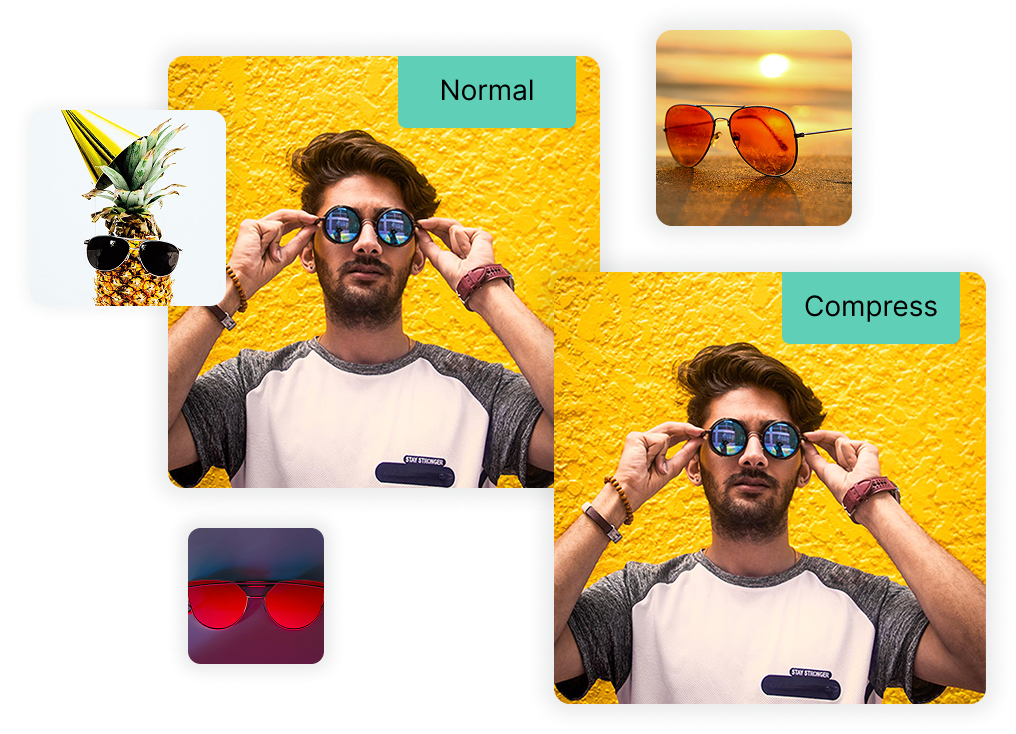Compress WEBP
Compress WEBP images online with a free WEBP optimizer. Drop WEBP images below to compress and optimize them in seconds
Compress WEBP images online with a free WEBP optimizer. Drop WEBP images below to compress and optimize them in seconds
Or drag your images here
Sign up to use our free API in your next project and automatically compress images at scale
Easily compress WEBP images online instantly and effortlessly. No installation or plugins required. Simply drop your WEBP images into our converter, and receive your WEBP file in seconds fully optimized with no loss in quality.

You can optimize WEBP images on the fly, securely, ad-free and inside your browser.
Developers can get an API to automatically compress their WEBP images!

More than compressing your WEBPs. Generative Fill, Generative Object Removal and Generative Replace are just a few examples of how AI can enhance and customize images, providing flexibility in content creation.

Whether it’s 3D animations, interactive product displays or real time filtering, Cloudinary’s API gives you a lot of image enhancement features. Developers can easily make older images look great again!

Automatic optimization guarantees that images are delivered in the highest quality and most suitable format for the user’s device, browser, or connection. Whether it’s JPG, PNG, WEBP, HEIC or any other image format the most efficient format is automatically selected for optimal performance.

Use our compressor to batch compress WEBP images, or sign up for our free API to automatically optimize all your WEBP images!

Create automated workflows with preset configurations to save time and ensure that files are automatically transformed and ready for delivery right after upload.

Go beyond WEBP with support for cutting-edge formats like JXL and AVIF. These advanced formats ensure that your visual assets are delivered with the best combination of quality and efficiency.
Use WEBP compressor in 3 simple steps, or sign up for Cloudinary to programmatically optimize thousands of your web images!
Upload or drag and drop your images into the browser
Start optimizing your WEBP images by compressing them to smaller sizes.
Once the compression is complete, download your optimized WEBP images
We’re showing a resized version of the original asset to avoid slow loading speeds. View the original.
Get Answers to Your Questions About Our Chat Software and Features
WEBP is a modern image format developed by Google, designed to provide superior compression and image quality for use on the web. WEBP supports both lossy and lossless compression, making it versatile for various applications, from high-quality photographs to transparent graphics. The format is known for producing smaller file sizes compared to traditional formats like JPEG and PNG, while maintaining or even improving visual quality. WEBP also supports features such as transparency (like PNG) and animation (like GIF), making it a comprehensive format for delivering optimized images on websites, apps, and digital platforms.
Cloudinary automatically optimizes and delivers WEBP images, allowing you to take full advantage of its compression capabilities while ensuring fast loading times and high-quality visuals.
Yes, it is possible to compress a WEBP image without losing quality when using its lossless compression option. Lossless WEBP compresses images by efficiently encoding image data without any degradation, ensuring that the image remains exactly as it was originally captured or designed. This feature is particularly useful for graphics that require high fidelity, such as logos and images with text. When using WEBP in its lossy mode, some quality is sacrificed to achieve even smaller file sizes, but the format is designed to minimize visible quality loss, often outperforming JPEG and other formats in maintaining image clarity. Cloudinary enables you to compress WEBP images using lossless compression automatically, ensuring your images retain their quality while benefiting from reduced file sizes.
To optimize WEBP images for web use, start by resizing the image to the exact dimensions needed for your web page, which helps minimize file size. Then, select the appropriate compression mode—lossy for photographs and complex images where file size reduction is a priority, and lossless for graphics where quality must be preserved. Additionally, remove any unnecessary metadata, such as color profiles or EXIF data, to further reduce file size. WEBP’s inherent efficiency often results in significantly smaller files compared to other formats, making it ideal for optimizing images for faster load times and improved website performance.
Cloudinary automatically optimizes WEBP images for the web by resizing, compressing, and delivering them in the most efficient format, tailored to the viewer’s device and network conditions.
Converting a WEBP image to another format to reduce file size without losing quality depends on the target format and the original compression used. Converting a lossless WEBP to another lossless format like PNG will retain quality but may result in a larger file size due to the less efficient compression of PNG. Conversely, converting a WEBP to a lossy format like JPEG could reduce file size further but at the expense of some image quality. However, since WEBP is often more efficient than other formats, it typically produces smaller files at comparable or better quality, making it unnecessary to convert to another format for file size reduction.
Cloudinary provides easy conversion from WEBP to other formats, allowing you to adjust the image format based on your needs while controlling the balance between file size and quality.